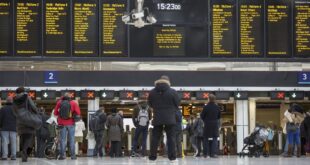ST. JOHN’S, N.L. —
The COVID-19 pandemic casts its shadow over a budget that doesn’t rock the boat.
Finance Minister Siobhan Coady says she believes it’s a responsible budget, under the circumstances.
“It’s certainly a hold-the-line budget. We’re in the middle of a pandemic,” said Coady.
But the numbers show the troubles facing the province. The net debt of the province has hit $16.4 billion, down $300 million from the July projection.
As a result, over $1.5 billion will have to be spent on debt servicing, the second highest expense for the province after health care at just over $3 billion.
Budget 2020-21
The numbers
- Revenue: $7,129 billion
- Expenditure: $8.967 billion
- Deficit: $1.838 billion
- Borrowing requirement: $3 billion
- Net debt: $16.4 billion
- Projected oil price: USD$39
- Projected oil royalties: $532.7 million
Highlights
- $25-a-day child care coming in 2021 ($3M in 2020-21 budget, estimated $12M annual cost)
- New 20 per cent vaping tax, expected to generate $313 million.
- $30 million small business assistance program, $25 million for small business, $5 million for community-based organizations
- $100 million available for PPE, testing and vaccine distribution
- 14 new drugs covered under prescription drug program
- $170 million for highways and bridges, $39.8 million toward Trans-Labrador Highway
- $20.4 million for adult mental health and addictions hospital
- $46 million for ongoing construction of schools in Gander, Paradise, Bay Roberts and St. Albans.
- $3 million toward HMP replacement, construction starts in 2022
- $14.1 million to convert public buildings from oil to electricity
- $2.5 million for ground search and rescue and Innu in child protection system inquiries, both to start in 2020
A few weeks ago, Premier Andrew Furey appointed Moya Greene, former Canada Post and Royal Mail CEO — with a history in privatization — to make recommendations on what the next budget will look like.
“I think every Newfoundlander and Labradorian recognizes that we have some structural issues that need to be addressed,” said Coady.
“We’ve got one of the best and the brightest of Newfoundland and Labrador helping with that, Moya Greene. She’s going to look at all of our expenses, the financial situation in the province, look at our economy, and give good suggestions. We’re going to look at those suggestions and see what makes sense.”
Coady says she’s seen some of the structural issues she knows have to change.
“How do we deliver services better to the province? I’ve talked about digital government,” said Coady.
“We’ve introduced, for example, nurse practitioners on the internet — telemedicine. We’ve put money towards having nurse practitioners over 811 because it delivers better health care to the people of the province. That’s just come from the pandemic, so maybe if we go down that path we can have better services at better cost.”
Due to the continuing uncertainty surrounding the COVID-19 pandemic, the Department of Finance could not offer any sort of projection on what the finances of the province will like in time for next year’s budget.
The next highest expense for the province after debt servicing is K-12 education, which is expected to cost $842 million.
A few weeks ago, Premier Andrew Furey appointed Moya Greene, former Canada Post and Royal Mail CEO with a history of privatization, to make recommendations on what the next budget will look like.
“I think every Newfoundlander and Labradorian recognizes that we have some structural issues that need to be addressed,” said Coady.
“We’ve got one of the best and the brightest of Newfoundland and Labrador helping with that: Moya Greene. She’s going to look at all of our expenses, the financial situation in the province, look at our economy and give good suggestions. We’re going to look at those suggestions and see what makes sense.”
Coady says she’s seen some of the structural issues she knows have to change.
“How do we deliver services better to the province? I’ve talked about digital government,” said Coady.
“We’ve introduced, for example, nurse practitioners on the internet: Telemedicine. We’ve put money towards having nurse practitioners over 811 because it delivers better health care to the people of the province. That’s just come from the pandemic, so maybe if we go down that path we can have better services at better cost.”
Due to the continuing uncertainty surrounding the COVID-19 pandemic, the Department of Finance could not offer any sort of projection on what the finances of the province will like in time for next year’s budget.
Progressive Conservative Leader Ches Crosbie says the debt servicing costs of $1.5 billion are a massive anchor around the province’s neck.
“Someone asked me about the last two budgets not doing anything meaningful to wrestle with the debt and deficit problem … I said you could say that about the last five budgets under the Liberals,” said Crosbie.
“That remains true about this one.”
Childcare coming
Parents around the province can look forward to $25-a-day childcare, beginning on Jan. 1, 2021.
The provincial government will provide the funding to government-regulated childcare centres throughout the province.
The program will cost $3 million to prepare in 2020, with a $12-million to $15-million expected price tag for the program on an annual basis.
“Regulated daycare operations are something government can inspect, ensure the safety, the quality of the daycare,” said Osborne.
“That’s not to say unregulated aren’t a good quality — I’m sure many are — but we have no way of knowing. The subsidy will be provided to regulated daycares and able to be inspected and overseen by government.”
According to Osborne, the current cost of regulated childcare spaces averages $44-per-day.
Research to begin offering the childcare was begun after Premier Furey announced $25-a-day childcare in his leadership campaign, according to Osborne.
New Democratic Party Leader Alison Coffin says $25-a-day childcare has been called for much longer than the premier’s leadership bid.
“We’ve been waiting since 1999,” she said.
“Babies have been born and gone to university in that time.”
Coffin says the NDP made an explicit ask for the policy back in February. She’s frustrated it took this long.
“Back in February, the minister of finance said ‘yes, we’re going to be able to build this in,’” she said.
“As soon as Premier Ball said he was resigning, we got ‘Alison, we don’t think there’s enough money for $25-a-day childcare. Fast forward six months later, it magically appears.”
RELATED:



